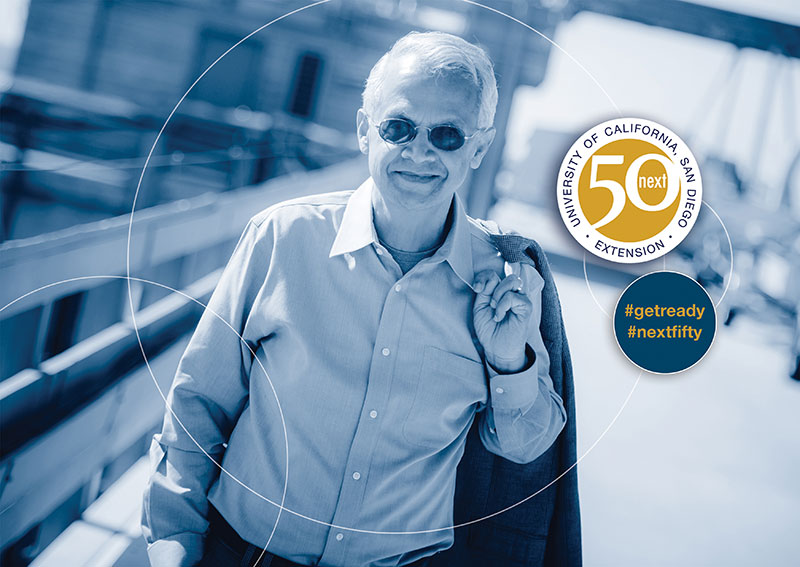19 April 2016
50 Voices of the Future: V. Ramanathan on climate change

In honor of UC San Diego Extension's first 50 years, 50 Voices of the Future asks thought leaders about the trends, breakthroughs and social advances they foresee over the next 50 years.
As one of the world’s leading experts on climate change, Dr. Veerabhadran Ramanathan is a scientist and also, by necessity, a student in the art of public relations. As he sees it, a critical part of his job is convincing people to take action. Failure to do so would be catastrophic: storms of biblical proportions, life-threatening droughts, population centers inundated by rising seas, “millions if not hundreds of millions of climate refugees.”
Dr. Ramanathan, who teaches at both UC San Diego and the Scripps Institution of Oceanography, has won countless awards for his pioneering research on greenhouse gases and other work. He believes climate change poses a threat to humanity’s very existence, and he’s become adept at working with leaders around the globe to spread this message. He’s even forged ties with religious leaders, leveraging his position as a member of the Vatican’s Pontifical Academy of Sciences. “I don’t have the authority to talk about morality and ethics,” he says, “but our faith leaders do.”
Will he and his colleagues succeed in convincing the world to address this problem? Given the alternative, he believes the answer is yes. “Either we evolve or we perish.”
(1) Why is the work you do important?
At the rate we are polluting the planet, in a few decades there will be so much pollution in the air that climate change could become an existential threat. We now still have a chance to slow this pollution down significantly and avert a major disaster this century. Those actions are to be taken now. That’s why there’s a sense of urgency for this message. I would say 140 million Americans do not think yet that we need drastic action – 40 to 45 percent of Americans. We need to work on that. One way I’m trying to deal with that is to bring in faith leaders so that this is taught in every church, every mosque, every synagogue, every temple. That will help us elect the leaders who will work to protect our future generations.
(2) What are the influential/exciting developments happening in your field now and why?
The first thing is the Paris Agreement (the 2015 accord creating the framework for reducing greenhouse-gas emissions). I was at that summit as Pope Francis’s representative. Leaders of all the nations have agreed. It covers about 95 percent of all our polluting nations. In that sense we have taken a major step forward.
I also lead a multi-campus effort on carbon neutrality and climate stability. We released a report last October. We have come up with ten solutions to slow down the problem. Each one of these solutions can be put into practice now. There are so many solutions that people are working on. There is a massive mobilization of academics to take their knowledge and translate it into solutions.
(3) What’s the next big thing?
We need to make our economy carbon-free. My car is an electric car. In my house, I have solar. I’m fossil-fuel free. I’m not saying everybody can do that. It’s expensive. But we need to make people aware and we need incentives – tax rebates, tax deductions, etc. The technology is there. We can electrify all our end users -- cars, everything in your house -- and then generate that electricity using solar, wind and other renewables such as biogas.
(4) How big of an impact will your field play in shaping the future of the San Diego region and beyond?
When you take something from nature, put it back so that your children and grandchildren can enjoy it. So in that sense, if the world becomes renewable and San Diego becomes renewable, we will be preserving our coastline, we’ll be preserving our airport, which won’t go under seven feet of water.
(5) Hop into your time machine…what does the future look like for this field in 50 years? How can individuals/companies get prepared for what’s next?
Fifty years from now the planet is going to be warmer, much warmer, by about two degrees if not more. Sustainability will become the guiding principle. We will put back what we take from nature. The fundamental problem is we don’t know how to get rid of our waste – the plastic, the junk that comes out of our cars, how we pollute our rivers with chemicals. All of that will change. And we have to change.
Explore the Environment & Sustainability programs and courses that UC San Diego Extension offers, as well as tuning into UCSD-TV on May 16th for the premiere of Bending the Curve on Climate Change with V. Ramanathan.